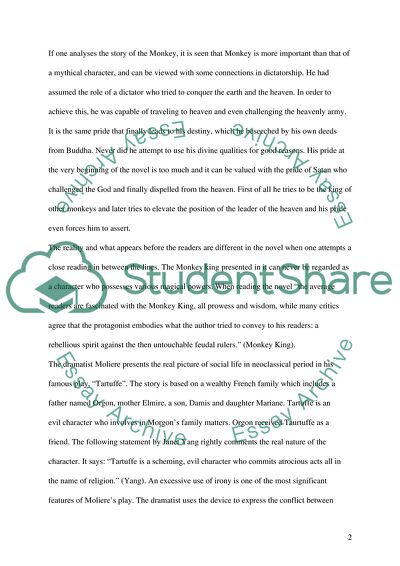
- Home
- Free Samples
- Premium Essays
- Editing Services
- Extra Tools
- Essay Writing Help
- About Us
- Studentshare
- Subjects
- Miscellaneous
- Tartuffe vs. Monkey
Tartuffe vs. Monkey - Essay Example

- Subject: Miscellaneous
- Type: Essay
- Level: Undergraduate
- Pages: 4 (1000 words)
- Downloads: 0
- Author: devonte31
Extract of sample "Tartuffe vs. Monkey"
He is believed to be the author of one of the four great classical novels of Chinese literature, ‘Journey to the West,’ written in the vernacular tongue and which was later translated into English as ‘Monkey.’ The novel is regarded in the literary world as the widely discussed and one among the most read, that deals with the Chinese myth connected with Monkey, who was born out of a stone egg and wished to be more powerful than that of the Emperor Jade of heaven. He became an expert in different magical arts and in martial arts after learning from his master Taoist.
Monkey in the novel has been portrayed with some kind of halo, with the ability to transform himself into more than seventy forms. Moliere’s play, Tartuffe is considered as the finest example of the neoclassical form of comedy which questions the form of Shakespearean romantic comedies. The problem of reality appearance was a major theme in many of neoclassical literature. Moliere discussed contemporary social issues. As a social critic, Moliere presents an eccentric person, outsider of the rest of the society, who humiliates contemporary society through himself.
The theme of hypocrisy in the play is highly connected with the society. Moliere portrays hypocrisy as a girdle to politics and sex in that period. If one analyses the story of the Monkey, it is seen that Monkey is more important than that of a mythical character, and can be viewed with some connections in dictatorship. He had assumed the role of a dictator who tried to conquer the earth and the heaven. In order to achieve this, he was capable of traveling to heaven and even challenging the heavenly army.
It is the same pride that finally leads to his destiny, which he beseeched by his own deeds from Buddha. Never did he attempt to use his divine qualities for good reasons. His pride at the very beginning of the novel is too much and it can be valued with the pride of Satan who challenged the God and finally
...Download file to see next pages Read More
- TERMS & CONDITIONS
- PRIVACY POLICY
- COOKIES POLICY